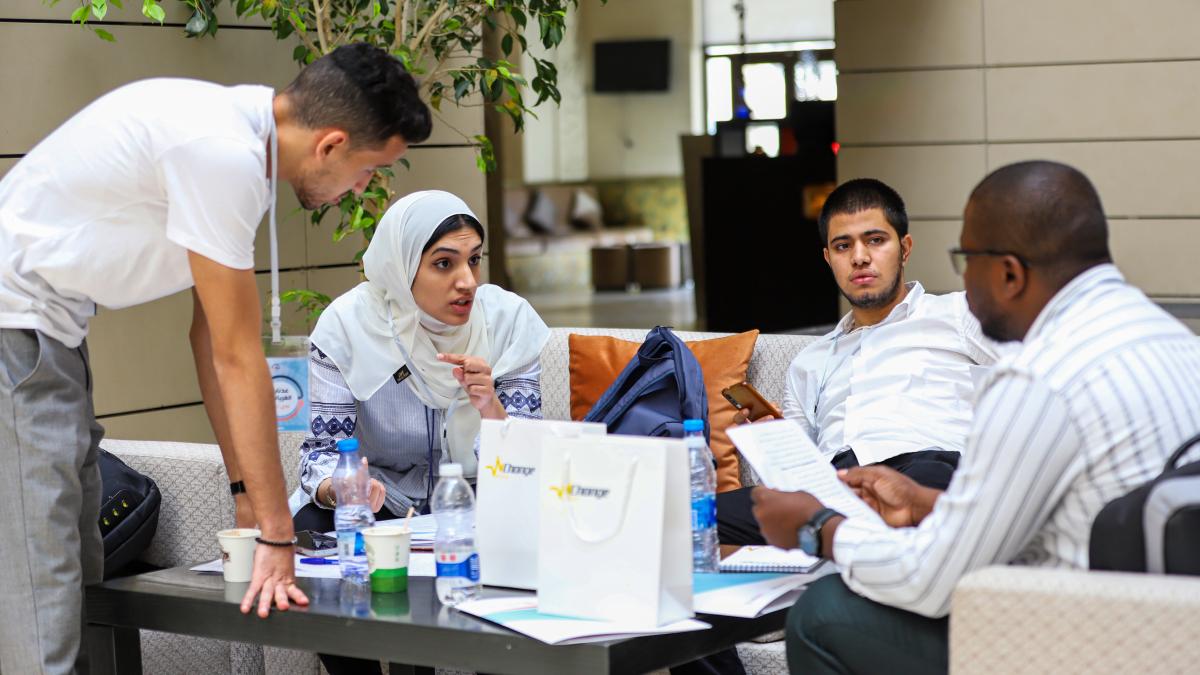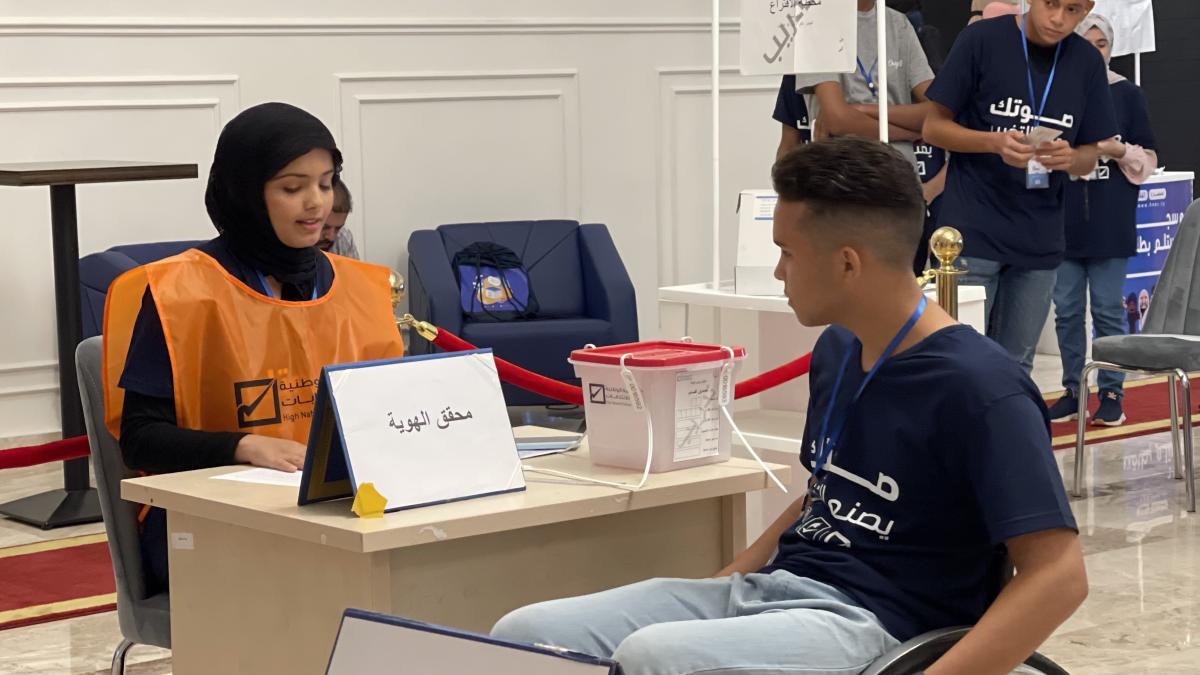USAID assistance helps to strengthen Libyan national and local government institutions, rule of law, the constitutional process, and elections and voter education. Despite the political impasse, USAID continues to provide an array of targeted assistance to build support for and enhance confidence in a stable, democratic Libyan government. This includes support for credible, transparent and inclusive electoral, political, and governing processes in Libya. USAID is helping to strengthen the ability of civil society and citizens to participate in the creation and adoption of a new constitution and the conduct of fair and peaceful elections, as well as helping make citizens’ voices heard in the decisions of their government. In areas recovering from recent conflict, USAID is supporting community reconciliation and recovery through community engagement and municipal council strengthening. USAID does this through the following programs:
LIBYA GOVERNANCE AND CIVIL SOCIETY PROGRAM
The Libya Governance and Civil Society Program, also known as Taqarib (the Arabic term for “coming together” or “growing closer”), supports Libya’s political transition by strengthening the pillars of a stable, democratic, and responsive Libyan state through empowered civil society and strong local government. Taqarib works in 30+ municipalities nationwide, including six in underserved southern Libya, to bolster local governments as they navigate the challenges of decentralizing public services. Taqarib helped establish local government offices that explicitly support women and people with disabilities, as well as entrepreneurship and the environment. The program also reinforces community bonds and promotes citizen engagement in public dialogues and prioritization of public resources, establishing trust after five decades of neglect, instigation, and conflict. The period of performance is 2019-2025.
Libya Governance and Civil Society Program (LGCS) Factsheet
ENGAGEMENT WITH VOTERS FOR EQUITABLE REPRESENTATION
Decades of authoritarian rule, instability, and violence hindered Libya’s transition to a unified government that can maintain security and deliver essential services to its people. The U.S. government supports the aspirations of the Libyan people to vote for a national government that is transparent, accountable, and inclusive. Engagement with Voters for Equitable Representation (EVER) will build on the significant achievements of the Libya Elections and Legislative Strengthening Activity which supported Libyan-led initiatives that improve election administration, bolster civic and voter education, and encourage civic and political participation. EVER will improve the effectiveness of key governance institutions and build the capacity of Libyan actors to advance elections and support the country’s ongoing transition to a stable and democratic state that is free from malign foreign influence. Through EVER, USAID will continue to leverage its established partnerships with national and sub-national entities, youth leaders, and civil society organizations to foster a broadly inclusive democracy that benefits all Libyans.
Engagement with Voters for Equitable Representation Factsheet
MEDIA INTEGRITY AND RESILIENCE, SUPPORTING AUDIENCES IN LIBYA
Political and institutional divides in Libya have led to a highly manipulated digital landscape. With more than six million active social media users in Libya, local and foreign actors are using social media as a tool to create a polarizing information environment that undermines civic institutions, disrupts efforts by like-minded international actors, and weakens community bonds. Through the Media Integrity and Resilience, Supporting Audiences in Libya (MIRSAL) activity, USAID will strengthen Libyan institutions by prioritizing information integrity, countering divisive narratives, and ensuring factual public interest media. MIRSAL will expand an existing partnership with BBC Media Action, which reaches 1.3 million Libyans with information to promote inclusion and social cohesion; and counter-narratives that empirical data show are the most effective way to build information resilience. MIRSAL will deliver trustworthy information and ideas that contribute to the nation’s stability and foster the inclusion of marginalized groups by creating safe online spaces.
Media Integrity and Resilience, Supporting Audiences in Libya Factsheet
MULTI DONOR RECONSTRUCTION FUND FOR MURZUQ PROGRAM
USAID launched the Multi Donor Reconstruction Fund for Murzuq Program in partnership with the United Nations Development Programme in support of the Global Fragility Act objectives to facilitate the return of internally displaced people to a stable and unified Murzuq - the site of large-scale clashes and displacement in 2019. The program will facilitate Libyan authorities’ ability to deliver on their commitments to fund and advance Murzuq’s nascent reconstruction. It will bring together international donors to support reconstruction efforts and provide a framework on how to best invest Libyan resources in an effective, transparent way that addresses community needs and builds a durable peace. Through this multi-donor initiative, USAID is able to invest a relatively small amount of assistance to create momentum, leverage diplomacy, and capitalize other donor assistance to achieve stability and peace in a critical area of southern Libya that was mired in conflict.
Multi Donor Reconstruction Fund for Murzuq Program Factsheet
LIBYA RECONCILIATION AND JUSTICE ACTIVITY
Following the success of the previous USAID initiative supporting Libyan led reconciliation leading to the groundbreaking 2022 Murzuq Peace and Reconciliation Agreement, USAID launched the Reconciliation and Justice Activity (LRJA). LRJA ensures that victims, citizens, communities, and civil society organizations have the knowledge and opportunities to meaningfully engage in reconciliation initiatives and transitional justice processes. USAID strengthens the capacities of national authorities and local stakeholders to launch reconciliation initiatives that promote peace, redress grievances, support mental health and psychosocial networks, and advance a durable political transition in Libya. Through LRJA, USAID supports citizen-led accountability and counters forces that seek to sow division. This activity contributes to the Global Fragility Act objectives to better integrate the historically marginalized south into national structures and to increase the participation of southern constituencies in governance and social frameworks that advance a unified and stable Libyan State.
Libya Reconciliation and Justice Activity Factsheet



